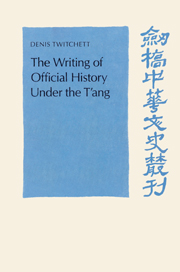Book contents
- Frontmatter
- Contents
- Preface
- Conventions
- List of abbreviations
- Part I The bureaucratic apparatus
- Part II The compilation of the historical record
- 3 Introduction
- 4 The Court Diaries (Ch'i-chü chu)
- 5 The Inner Palace Diary (Nei Ch'i-chü chu)
- 6 The Record of Administrative Affairs (Shih-cheng chi)
- 7 The Daily Calendar (Jih-li)
- 8 Biographies
- 9 Histories of institutions, historical encyclopedias, and collections of documents
- 10 The Veritable Records (Shih-lu)
- 11 The National History (Kuo shih)
- Part III The Chiu T'ang shu
- Appendix: Derivation of the Basic Annals chapters of Chiu T'ang shu
- Bibliography
- Index
9 - Histories of institutions, historical encyclopedias, and collections of documents
Published online by Cambridge University Press: 03 November 2009
- Frontmatter
- Contents
- Preface
- Conventions
- List of abbreviations
- Part I The bureaucratic apparatus
- Part II The compilation of the historical record
- 3 Introduction
- 4 The Court Diaries (Ch'i-chü chu)
- 5 The Inner Palace Diary (Nei Ch'i-chü chu)
- 6 The Record of Administrative Affairs (Shih-cheng chi)
- 7 The Daily Calendar (Jih-li)
- 8 Biographies
- 9 Histories of institutions, historical encyclopedias, and collections of documents
- 10 The Veritable Records (Shih-lu)
- 11 The National History (Kuo shih)
- Part III The Chiu T'ang shu
- Appendix: Derivation of the Basic Annals chapters of Chiu T'ang shu
- Bibliography
- Index
Summary
The formal institutionalization of history writing in the early T'ang led to an increasing professionalization of history, a concentrated effort to write history that was didactic not only in the broadest sense, as embodying the moral–ethical lessons the past had to offer to all educated men, but also in a narrower sense, providing those involved in the governance of the empire with a rich body of precedents and examples. This aspect of official historiography was dealt with some thirty years ago by Etienne Balazs in an important study in which he summed up the motivation of the state historians in a telling if exaggerated sentence: “History was written by officials for officials.”
Making the mass of material accumulated by the historians readily accessible to these potential specialist readers necessitated the rational categorization of information and the assemblage together of the documentation and decisions on specific subjects. The rational organization and categorization of knowledge was very much in fashion during the early T'ang. It can be seen in the grand-scale attempts to normalize and codify criminal and administrative law and ritual behavior: It can be seen in the huge state-sponsored genealogical compilations that tried to define a fixed social order.
- Type
- Chapter
- Information
- The Writing of Official History under the T'ang , pp. 84 - 118Publisher: Cambridge University PressPrint publication year: 1992



